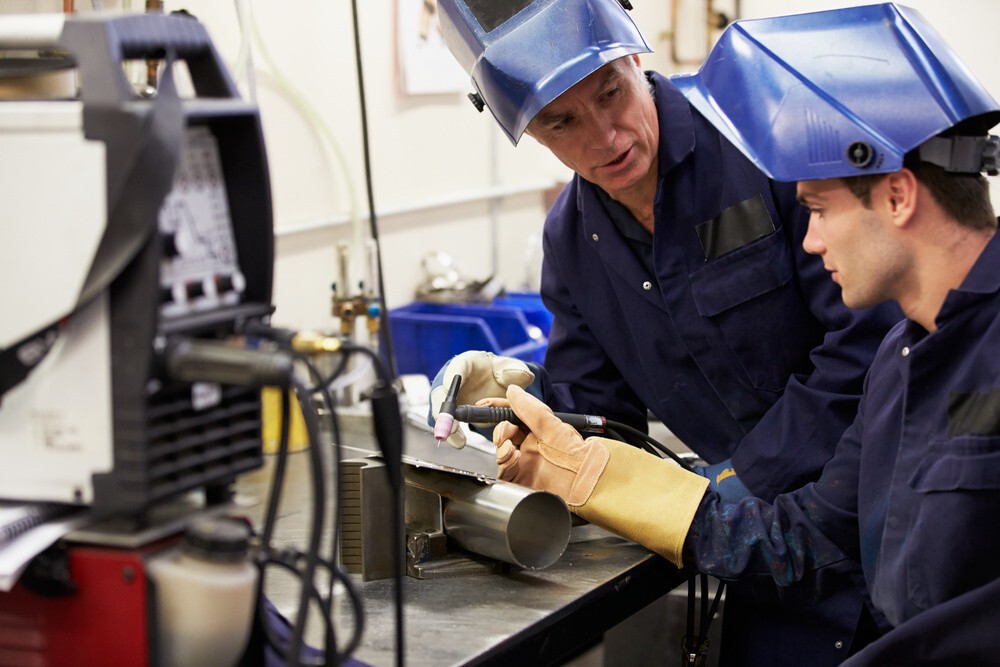If you are planning to jump into the field of welding, you have come to the right place. Welding is a notable career choice to have, and by reading this article, you will know that from where you should start with and how you can proceed to the top of it.
Having a passion is great but starting up is a difficult process. In the case of welding, it is a complete physical job and requires complete focus and attention to detail.
Welding is one of the few careers which is never going to go down and will always be in demand, and welders are considered as an integral part of the industry.
After going through the book details and knowledge, it is better to get hands-on experience to become a professional welder, and for that, the best thing you can do is to do an apprenticeship.
Table of Contents
Apprenticeships and Its Benefits
An apprenticeship is a program or system in which freshers get the on job training and experience so that they become aware of the physical changes and properties.
It is very important for a beginner to be aware of the system before doing any practical work, especially for the welders, as they are going to work with intense heat and electricity.
By completing the apprenticeship program, you get a chance to polish your skills and will be ready to get a professional job easily.

Is Apprenticeship Necessary for The Welder?
Welding not only involves joining the two metals, but it is a versatile field, and you have to do the job of different sizes and shapes in different conditions and environments.
The apprenticeship will help the welders to get the practical knowledge and experience of welding techniques and methods, safety protocols and procedures, industrial mathematics, required electrical and mechanical concepts, and so many other related things.
Jumping directly in the field without getting the apprenticeship experience, a welder may harm himself and others and can cause major destructions.
Above all, during the apprenticeship, you work in a professional working environment, which not only gives you confidence and self-determination but also helps you in troubleshooting and real-world capability of dealing with the hazards.
The best thing is that you may start earning while on the apprenticeship program, and on completion, you get the acknowledgment and will be awarded with the nationally recognized certificate.
It is now clear that apprenticeship is a stepping stone towards the end goal of becoming a professional welder.
Finding the Right Apprenticeship Program
Employer-based apprenticeship programs are offered by the companies on a need base and are usually paid, while on the other hand, educational-based apprenticeship programs are offered as a part-time which you can do during your study program, and these are generally unpaid.
If you have completed your study and are ready to go into the field, then you must go for the employer-based apprenticeship program, and on completion, the company may offer the full-time job based on availability and performance.
Welding is a versatile field and involves many skills, techniques, and trades such as plumbing, electrical, construction, etc.; each field involves different methods and procedures.
Therefore, at this point, you should be clear with yourself that in which field you will like to pursue so that your time is not wasted and you get the exact set of skills you are fond of.
Once you have selected the field in which you are interested, only then you should start looking for the apprenticeship programs. There are a lot of ways to look for openings, some of them which are discussed below.
- Government Support Programs
Apprenticeship programs vary from country to country; when you start looking for it, you must check whether your government offers it or not.
You can check this by checking related government websites such as the U.S. Department of Labor lets you find the appropriate apprenticeship program.
- Local Welders Union
Local welders union is another way of fining the apprenticeship opportunity in your area as the local welders are associated with the companies in which welders are required.
- Vocational Training Programs
If you are still unable to get an apprenticeship program by the means as mentioned above, in that case, you should start looking for vocational training programs in your area, which are offered by schools and companies.
You will be able to find different kinds of apprenticeships programs by the above methods, select the one that suits you the best according to your preferred welding trade, and look for the company’s details and date on which the position was posted. Apply for it, follows the particular instructions, and you will get a reply within a few days.
Apprenticeship Duration
The apprenticeship duration depends on individual opportunity; typically, it takes more than a year to get fully prepared for the toughest job of the welders.
It is worth the time as you will get practical experience by working alongside the professional welders, and by the time it ends, you will be ready to get a full time highly paid job.
It will start from the very basics gradually you will be given a chance to starts practicing with the machinery, with time and experience you will get better day by day.
It would be best if you utilized this time properly, observe carefully, ask as many questions as you want, get involved, and take full advantage of working with professional welders by giving attention to details.
Objectives
By the end of the program, you will be able to use various welding applications and can apply various procedures such as:
- Will be able to take exact and precise measurements and can draw drawings, patterns, and layouts.
- Will be familiar with the safety protocols, rules, and procedures.
- Will have a deep knowledge of welding equipment, methods, and techniques.
- Will have a sound knowledge of various welding codes and terminologies.
- Can perform the given task in accordance with the instructions carefully and accurately.
- Will be familiar with other welding methods and procedures.
- Can apply concepts and theories to solve real-world problems.
- Can deal with a variety of metals and can apply appropriate welding techniques.
- Can identify and resolve errors and issues during the process.
